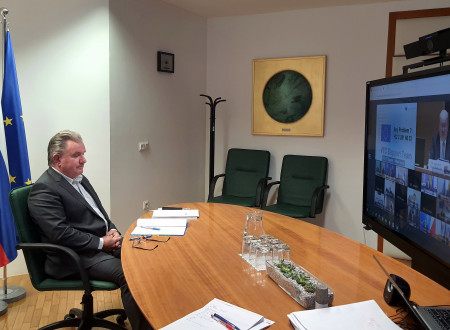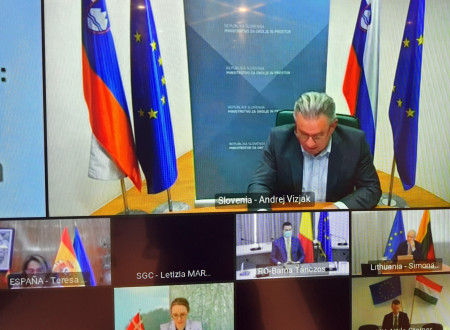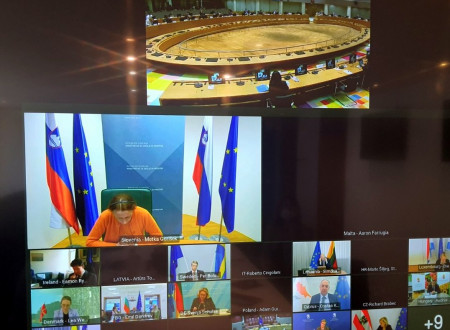Climate-neutral society - From planning to implementation
- Ministry of the Environment and Spatial Planning
- Permanent Representation to the European Union Brussels
In the discussion, Minister Vizjak highlighted that "the implementation of measures related to digitalisation, biodiversity, water management, in particular flood protection, and strengthening resilience to natural disasters and improving waste management is particularly important." It is important to be aware that we are witnessing accelerating and intensifying climate change, which needs to be tackled at all levels. A number of measures are being introduced and implemented in Slovenia to increase improvement resilience to the effects of climate change. These include, for example, anti-flood and post-reconstruction measures to improve the resilience of infrastructure and strengthen resilience to natural disasters, in particular landslides and floods caused by excessive rainfall. It is important to stress that the main purpose is to respond to the shortcomings of the new EU Adaptation Strategy, to respond to the dosing of shortcomings in the implementation of climate change adaptation measures. Which is also a critical element in strengthening global adaptation ambitions in line with the Paris Agreement and the Sustainable Development Goals.
Ministers discuss As part of the discussion on recovery and resilience plans and the role of the European Semester, which provides a framework for the coordination of economic policies between EU countries and it allows them to discuss their economic and budgetary plans throughout the year and to monitor progress over specific periods. State Secretary clearly emphasised that the planned projects are important for sustainable economic recovery, address the challenges of climate change and other environmental challenges, and are key to addressing specific national gaps. "We are referring here to more effective waste management in terms of reliable self-sufficiency and contributing to the circular economy." With the planned measures and reforms under the Recovery and Resilience Facility, Slovenia will achieve a number of positive effects in several areas, such are for example flood safety measures, which will contribute to biodiversity conservation, drought prevention, protection of water resources, groundwater enrichment and the stabilisation of high waters.
As part of the political debate, the State Secretary welcomed the proposal for a regulation concerning batteries and waste batteries constituting an update of the EU’s. Regulatory framework for batteries and an integral part is a part of the European Green Deal, as the batteries development and production form strategic priorities for Europe in the context of the transition to clean energy. The proposal addresses the entire life cycle of batteries, which is essential for sustainable mobility and reducing emissions, and is important for achieving climate neutrality and the goals of the circular economy. The proposed regulation will also be an important legislative act under the Slovenian Presidency of the Council of the EU, during which Slovenia will strive to achieve the greatest possible progress in negotiations within the Council.
In other matters, the Portuguese Presidency provided information on the consensus reached within the Council on the proposal for a regulation on the 8th Environment Action Programme and on the state of play at the opening of negotiations with the European Parliament.
The Programme proposal encompasses a long-term vision and priority environmental objectives in support of the EU’s common commitment to green transition and is valid until the end of 2030. It sets six thematic priorities: reducing GHG emissions and increasing sinks; adaptation to climate change; circular economy and economic growth separate from resource use; non-toxic environment; biodiversity protection and sustainable production and consumption.
The Portuguese Presidency made as information on the progress made in addressing the European Climate Law.
The conference was preceded by the traditional meeting of the ministers of the Green Growth Group, in which Slovenia also participates, addressing the topic of the climate and energy legislative package "Fit for 55" and the European Climate Law legislative package.
Slovenia supports the efforts of the Portuguese Presidency to reach an agreement with the European Parliament as soon as possible on the European Climate Law aiming for climate neutrality by 2050.
Minister highlighted that “I can assure you that the Fit for 55 package will be a priority during the Slovenian presidency.”




